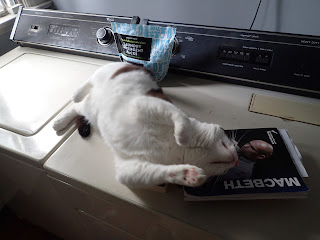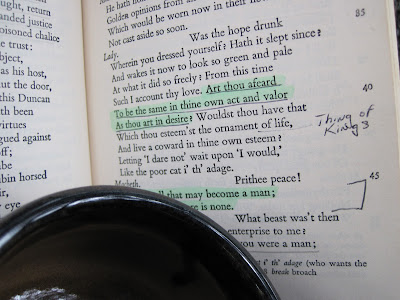A favorite scene: Shakespeare's Macbeth, Act 5, scene 3.
The bloody usurper is about to find that the tide of fortune has turned against him. Macbeth is both a blunt fist and a haunted soul, though the blood beats the nerves every time. I've always felt drawn to Macbeth, though I am not entirely sure why. Certainly, you've got to love a character who claims he'll never quit, and who lives up to that claim, mostly, but for one moment of doubt. And who would gainsay this man that doubt after such fatal promises?
"I'll fight till from my bones my flesh be hack'd." With that line Shakespeare channels much of the old heroic alliterative beat-based tradition. You can hear Beowulf and Byrtnoth in that line.
Macbeth is a heroic play. Heroic, but twisted, bewitched, as we all know. Lord Byron's favorite of Shakespeare's plays, at least in his youth. (You can see a bloody Scottish hand all over Manfred, for example.) I think Anthony and Cleopatra spoke clearly to him as the years of exile accumulated. Still, despite (or because of) the iniquities of Macbeth's character, I find much in the play that draws me back again and again. The starkness, the bloody dilemmas, the feast of fortune and the failure of reading fate: all that and more.
Reread with me this time:
 Dunsinane. A room in the castle.
Dunsinane. A room in the castle.
Enter MACBETH, Doctor, and Attendants.
MACBETH: Bring me no more reports; let them fly all:
Till Birnam wood remove to Dunsinane,
I cannot taint with fear. What's the boy Malcolm?
Was he not born of woman? The spirits that know
All mortal consequences have pronounced me thus:
'Fear not, Macbeth; no man that's born of woman
Shall e'er have power upon thee.' Then fly, false thanes,
And mingle with the English epicures:
The mind I sway by and the heart I bear
Shall never sag with doubt nor shake with fear.
[Enter a Servant.]
The devil damn thee black, thou cream-faced loon!
Where got'st thou that goose look?
Servant: There is ten thousand--
MACBETH: Geese, villain!
Servant: Soldiers, sir.
MACBETH:
Go, prick thy face, and over-red thy fear,
Thou lily-liver'd boy. What soldiers, patch?
Death of thy soul! those linen cheeks of thine
Are counsellors to fear. What soldiers, whey-face?
Servant: The English force, so please you.
MACBETH:
Take thy face hence.
[Exit Servant.]
Seyton!--I am sick at heart,
When I behold--Seyton, I say!--This push
Will cheer me ever, or disseat me now.
I have lived long enough: my way of life
Is fall'n into the sear, the yellow leaf;
And that which should accompany old age,
As honour, love, obedience, troops of friends,
I must not look to have; but, in their stead,
Curses, not loud but deep, mouth-honour, breath,
Which the poor heart would fain deny, and dare not.
Seyton!
[Enter SEYTON.]
SEYTON:
What is your gracious pleasure?
MACBETH: What news more?
SEYTON: All is confirm'd, my lord, which was reported.
MACBETH:
I'll fight till from my bones my flesh be hack'd.
Give me my armour.
SEYTON: 'Tis not needed yet.
MACBETH:
I'll put it on.
Send out moe horses; skirr the country round;
Hang those that talk of fear. Give me mine armour.
How does your patient, doctor?
Doctor:
Not so sick, my lord,
As she is troubled with thick coming fancies,
That keep her from her rest.
MACBETH:
Cure her of that.
Canst thou not minister to a mind diseased,
Pluck from the memory a rooted sorrow,
Raze out the written troubles of the brain
And with some sweet oblivious antidote
Cleanse the stuff'd bosom of that perilous stuff
Which weighs upon the heart?
Doctor:
Therein the patient
Must minister to himself.
MACBETH:
Throw physic to the dogs; I'll none of it.
Come, put mine armour on; give me my staff.
Seyton, send out. Doctor, the thanes fly from me.
Come, sir, dispatch. If thou couldst, doctor, cast
The water of my land, find her disease,
And purge it to a sound and pristine health,
I would applaud thee to the very echo,
That should applaud again.--Pull't off, I say.--
What rhubarb, senna, or what purgative drug,
Would scour these English hence? Hear'st thou of them?
Doctor:
Ay, my good lord; your royal preparation
Makes us hear something.
MACBETH:
Bring it after me.
I will not be afraid of death and bane,
Till Birnam forest come to Dunsinane.

Doctor: [Aside]
Were I from Dunsinane away and clear,
Profit again should hardly draw me here.
[Exeunt.]
I love the doctor's aside at the end here. He's speaking to and for us, and the wry humor is just another example of Shakespeare's canny layering of emotions. Just look at all the emotions the Scottish king is cycling through in what I've quoted. A brutal confidence may be overriding the doubts of others, but an underlying melancholy undercuts the hubristic joy some other battle-king would be feeling much more sincerely. Macbeth knows he's crossed the line that divides proper manliness, in his terms, from monstrosity, that separates society from those outside it, whether they be nobles or not. Macbeth truly is a usurper and a murderer, and he knows it too too well. Yet he was a glorious thane with all the martial skills that his true king admired, and that's a fact too often neglected by readers of the play, I feel.
Macbeth, above, is at his most Hamletish, if you will, and yet Scottish king and Danish prince burn with strikingly divergent fires. The bonfire of ambition vs. a funeral pyre? Or, perhaps, the way into the parallels and contrasts between these noble figures would be to consider the patterns woven from emotion and intellect, from ambition, hubris, consciousness, responsibility, shame, guilt, anger, and revenge.
I should work on the Macbeth vs. Hamlet conundrum--aiming at the nuances rather than the broad strokes--for that's what I feel it is, a conundrum, as I hear and feel the echoes between the plays. I even have some of the best books on the shelf or in mind to check what the authorities have claimed, but I want to work these two characters out in conjuncton for myself, by myself. An independent exercise in critical reasoning, in dynamic character construction and storytelling: something I think all of us should practice often. (I've been reading a book on Beowulf in which the lack of critical practice and of dynamic narrative awareness has been so frustrating.)














































